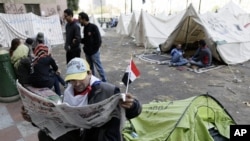CAIRO —
Egyptian opposition leaders are refusing a call by President Mohamed Morsi for a dialogue, insisting that he put off a Dec. 15 referendum on a new draft constitution and give up sweeping powers. Tensions in Cairo are also mounting as pro- and anti-Morsi demonstrators gather in different parts of the capital to protest.
A crowd of Islamist supporters of the president gathered at Cairo's Al-Azhar mosque Friday to mourn several of their members killed in violent clashes Wednesday. The Supreme Guide of the Muslim Brotherhood, Mohammed Badie, delivered a eulogy to honor those killed.
At the same time, opponents of the president gathered in other parts of the capital to protest what they say are autocratic measures by Morsi. Opposition leaders want him to give up sweeping powers that he has taken and postpone a December 15 referendum on a new constitution.
Several thousand protesters chanted against Morsi near the presidential palace, despite measures by the army to keep them away from the building. Earlier, Presidential Guard troops placed cement blocks topped with barbed wire across a main boulevard to block off the area.
Arab media reported that opposition leaders had rejected a call by the president to hold a dialogue Saturday at the presidential palace. Morsi had called for the meeting in a speech Thursday night, but failed to make any major concessions.
The head of the National Salvation Front, Mohammed ElBaradei, told supporters that the president's unwillingness to compromise has created what he calls "a disaster."
ElBaradei says it would have been possible to reach a national consensus over the constitution if Morsi had responded to repeated demands to annul a constitutional declaration giving him sweeping powers, and postpone the December 15 referendum.
Said Sadek, who teaches political sociology at the American University in Cairo, foresees a long period of instability stemming from the increasing polarization of Egyptian society. Sadek thinks the chaos will also erode Morsi's popular support:
"More instability, more chaos and more economic troubles would also undermine the regime of Morsi, because his social base is the countryside and some squatter settlements," said Sadek. "Now, when there is economic squeezing, this is a base that will be hit harder than the middle class and upper class and they will start screaming, 'where is the food, where is the bread?'"
Sadek says that President Morsi and his Islamist supporters have an us-versus-them view of society which inevitably creates conflict:
"The Islamists, wherever they are, they always cause division in society and the Muslim Brotherhood is dominated by a group who are elderly, under the influence of the writing of Sayyid Qutb, who divided the world into the society of believers and society non-believers," Sadek added. "So, they look at themselves as the chosen people and the rest are second class citizens."
Islamist followers of the Muslim Brotherhood and those of the more extreme Islamic Salafist sect have joined forces in the recent battle over the constitution. Secular, leftist and Christian opposition supporters claim that President Morsi is now governing in the name of Islamist forces, rather than of all Egyptians.
A crowd of Islamist supporters of the president gathered at Cairo's Al-Azhar mosque Friday to mourn several of their members killed in violent clashes Wednesday. The Supreme Guide of the Muslim Brotherhood, Mohammed Badie, delivered a eulogy to honor those killed.
At the same time, opponents of the president gathered in other parts of the capital to protest what they say are autocratic measures by Morsi. Opposition leaders want him to give up sweeping powers that he has taken and postpone a December 15 referendum on a new constitution.
Several thousand protesters chanted against Morsi near the presidential palace, despite measures by the army to keep them away from the building. Earlier, Presidential Guard troops placed cement blocks topped with barbed wire across a main boulevard to block off the area.
Arab media reported that opposition leaders had rejected a call by the president to hold a dialogue Saturday at the presidential palace. Morsi had called for the meeting in a speech Thursday night, but failed to make any major concessions.
The head of the National Salvation Front, Mohammed ElBaradei, told supporters that the president's unwillingness to compromise has created what he calls "a disaster."
ElBaradei says it would have been possible to reach a national consensus over the constitution if Morsi had responded to repeated demands to annul a constitutional declaration giving him sweeping powers, and postpone the December 15 referendum.
Said Sadek, who teaches political sociology at the American University in Cairo, foresees a long period of instability stemming from the increasing polarization of Egyptian society. Sadek thinks the chaos will also erode Morsi's popular support:
"More instability, more chaos and more economic troubles would also undermine the regime of Morsi, because his social base is the countryside and some squatter settlements," said Sadek. "Now, when there is economic squeezing, this is a base that will be hit harder than the middle class and upper class and they will start screaming, 'where is the food, where is the bread?'"
Sadek says that President Morsi and his Islamist supporters have an us-versus-them view of society which inevitably creates conflict:
"The Islamists, wherever they are, they always cause division in society and the Muslim Brotherhood is dominated by a group who are elderly, under the influence of the writing of Sayyid Qutb, who divided the world into the society of believers and society non-believers," Sadek added. "So, they look at themselves as the chosen people and the rest are second class citizens."
Islamist followers of the Muslim Brotherhood and those of the more extreme Islamic Salafist sect have joined forces in the recent battle over the constitution. Secular, leftist and Christian opposition supporters claim that President Morsi is now governing in the name of Islamist forces, rather than of all Egyptians.











